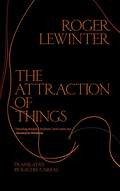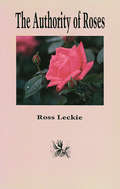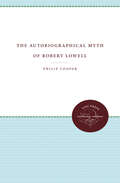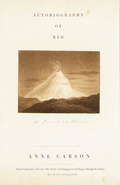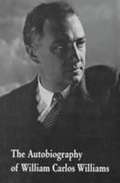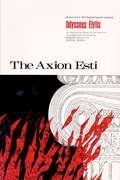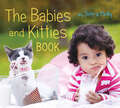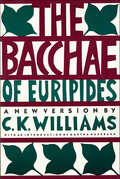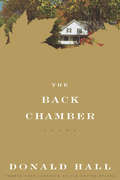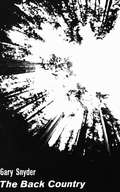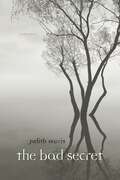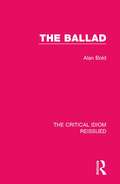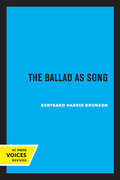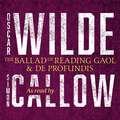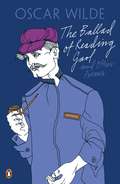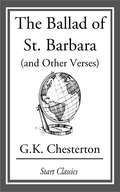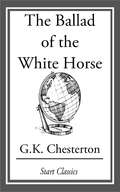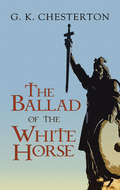- Table View
- List View
The Attraction of Things
by Roger Lewinter Rachel CareauStunning fragments that offer an epiphany of grace and beauty The Attraction of Things concerns the entirety of beauty and the possibility of grace, relayed via obsessions with rare early gramophone records, the theater, translation, dying parents: all these elements are relayed in a dizzying strange traffic of cultural artifacts, friendships, losses, discoveries, and love. Roger Lewinter believes that in the realm of art, "the distinction between life and death loses its relevance, the one taking place in the other." Whereas Story of Love in Solitude is a group of small stories, The Attraction of Things is a continuous narrative (more or less) of a man seeking (or stumbling upon) enlightenment. "The Attraction of Things," states Lewinter, "is the story of a being who lets himself go toward what attracts him, toward what he attracts--beings, works, things--and who, through successive encounters, finds the way out of the labyrinth, to the heart, where the bolt of illumination strikes. This is the story of a letting go toward the illumination."
The Aurorean, Volume XV, Issue 1, Spring/Summer 2010
by Cynthia Brackett-VincentThe poems play off the invisible web that connects all to the universe. There is a strong but quiet woven whisper between nature, humanity, the cosmos and time in this meditative and thoughtful book.
The Authority of Roses
by Ross LeckieNo postmodern gimmickry, no tricks except all the old ones that every good poet must learn: these lucid, evocative poems put the reader so clearly in the picture that you taste the blackberries of your childhood, shiver at the chill of rainwater down your neck in a western forest, or rake the dust from your hair as you trudge home from the Trojan War. Ross Leckie can capture the fleeting moments when we fully enter the world and believe we belong. At this low point in our country's cultural history, when more and more writers have become topical "content providers" for the ever-gaping maw of the society of the spectacle, those few artists like Ross Leckie who carefully craft their work within the poetic tradition, and who show respect for all the needs -- aural, esthetic, and intellectual -- of the most discerning readers, are more than ever to be valued.
The Autobiographical Myth of Robert Lowell
by Philip CooperLowell's continuing productivity and his ever-increasing stature as a poet demand a new evaluation of his work, and Cooper has provided it in this penetrating study. Though Cooper's primary purpose is to demonstrate the principle of the interrelation of the poems, a secondary and equally important purpose is to analyze the significance of Lowell's most recent work.Originally published in 1970.A UNC Press Enduring Edition -- UNC Press Enduring Editions use the latest in digital technology to make available again books from our distinguished backlist that were previously out of print. These editions are published unaltered from the original, and are presented in affordable paperback formats, bringing readers both historical and cultural value.
The Autobiography of Red
by Anne CarsonA NEW YORK TIMES NOTABLE BOOK OF THE YEARNational book Critics Circle Award Finalist "Anne Carson is, for me, the most exciting poet writing in English today."--Michael Ondaatje"This book is amazing--I haven't discovered any writing in years so marvelously disturbing." --Alice Munro The award-winning poet Anne Carson reinvents a genre in Autobiography of Red, a stunning work that is both a novel and a poem, both an unconventional re-creation of an ancient Greek myth and a wholly original coming-of-age story set in the present.Geryon, a young boy who is also a winged red monster, reveals the volcanic terrain of his fragile, tormented soul in an autobiography he begins at the age of five. As he grows older, Geryon escapes his abusive brother and affectionate but ineffectual mother, finding solace behind the lens of his camera and in the arms of a young man named Herakles, a cavalier drifter who leaves him at the peak of infatuation. When Herakles reappears years later, Geryon confronts again the pain of his desire and embarks on a journey that will unleash his creative imagination to its fullest extent. By turns whimsical and haunting, erudite and accessible, richly layered and deceptively simple, Autobiography of Red is a profoundly moving portrait of an artist coming to terms with the fantastic accident of who he is."A profound love story . . . sensuous and funny, poignant, musical and tender."--The New York Times Book Review"A deeply odd and immensely engaging book. . . . [Carson] exposes with passionate force the mythic underlying the explosive everyday." --The Village Voice
The Autobiography of William Carlos Williams
by William Carlos WilliamsThis autobiographical account of the life of William Carlos Williams recounts the challenges of being a busy physician in the town of Rutherford, New Jersey as well as pursuing a literary career. One of the finest chapters in this autobiography tells how each of his two roles stimulated and supported the other.
The Awful Rowing Toward God
by Anne SextonSexton's eighth collection of poetry is entitled The Awful Rowing Toward God. The title came from her meeting with a Roman Catholic priest who, although unwilling to administer last rites, told her "God is in your typewriter." This gave the poet the desire and willpower to continue living and writing. The Awful Rowing Toward God and The Death Notebooks are among her final works and both centre on the theme of dying.
The Axion Esti
by Odysseus Elytis Edmund Keeley George Savidis Samuel HazoThe Axion Estiis probably the most widely read volume of verse to have appeared in Greece since World War II and remains a classic today. Those who follow the music of Greek composer Mikis Theodorakis have been especially drawn to Odysseus Elytis's work, his prose is widely considered a mirror to the revolutionary music of Theodorakis. The "autobiographical" elements are constantly colored by allusion to the history of Greece, thus, the poems express a contemporary consciousness fully resonant with those echoes of the past that have served most to shape the modern Greek experience.
The Bab Ballads
by W. S. GilbertThe Bab Ballads is a collection of light verses by W. S. Gilbert, illustrated with his own comic drawings. The book takes its title from Gilbert's childhood nickname. He later began to sign his illustrations "Bab".
The Babies and Doggies Book
by John Schindel Molly WoodwardWhen you stop and think about it, babies and doggies do many of the same things. They squirm, sniff, sit, and splash. They play ball and cuddle. Lots of things babies do, doggies do too! This book explores all of the similar actions shared by baby and baby's best friend. Illustrated with beautiful, full-color photographs featuring an array of dog breeds and a diverse cast of babies, The Babies and Doggies Book is a visual feast for infants, a fun read-aloud for parents, and treat for baby- and dog-lovers.
The Babies and Kitties Book
by John Schindel Molly WoodwardJam-packed with colorful photos of adorable kittens and sweet babies, this rhyming book celebrates all of the ways kids and cats are alike. A companion to The Babies and Doggies Book.
The Bacchae of Euripides: A New Version
by C. K. WilliamsFrom the renowned contemporary American poet C. K. Williams comes this fluent and accessible version of The Bacchae, the great tragedy by Euripides. This book includes an introduction by Martha Nussbaum.
The Back Chamber: Poems
by Donald HallThe first full-length volume of poems in a decade by the former poet laureate of the United StatesIn The Back Chamber, Donald Hall illuminates the evocative, iconic objects of deep memory--a cowbell, a white stone perfectly round, a three-legged milking stool--that serve to foreground the rich meditations on time and mortality that run through his remarkable new collection. While Hall's devoted readers will recognize many of his long-standing preoccupations--baseball, the family farm, love, sex, and friendship--what will strike them as new is the fierce, pitiless poignancy he reveals as his own life's end comes into view. The Back Chamber is far from being death-haunted, but rather is lively, irreverent, erotic, hilarious, ironic, and sly--full of the life-affirming energy that has made Donald Hall one of America's most popular and enduring poets.
The Back Country
by Gary Snyder"A reaffirmation of a back country of the spirit."--Kirkus Reviews "A reaffirmation of a back country of the spirit."--Kirkus Reviews This collection is made up of four sections: "Far West"--poems of the Western mountain country where, as a young man. Gary Snyder worked as a logger and forest ranger; "Far East"--poems written between 1956 and 1964 in Japan where he studied Zen at the monastery in Kyoto; "Kali"--poems inspired by a visit to India and his reading of Indian religious texts, particularly those of Shivaism and Tibetan Buddhism; and "Back"--poems done on his return to this country in 1964 which look again at our West with the eyes of India and Japan. The book concludes with a group of translations of the Japanese poet Miyazawa Kenji (1896-1933), with whose work Snyder feels a close affinity. The title, The Back Country, has three major associations; wilderness. the "backward" countries, and the "back country" of the mind with its levels of being in the unconscious.
The Bad Secret: Poems
by Judith HarrisThe Bad Secret takes readers on a dark yet sometimes comic sojourn through the undercurrents of a life suddenly unmoored by grief, and then to the subsequent rise of the spirit to recovery. Tough-minded and intellectual, Judith Harris's poems are also distinguished by brilliant images close to metaphysical. They reflect on childhood, nature, mental and physical illness, the loss of a mother, and the levity of being simply human. In a voice entirely her own, Harris confronts life's secrets with their hidden meanings inspired by guilt and redemption, offering a music of tenderness and hope. I watch it gutter down, over the pine's edge,over the pink and orange sunset,diving into the abyss,with its wings perpendicular to the ravine.By now, I have broken offfrom the rest, pretending I'm an orphan -- my eyes fixed on the unseeable destructionof my ghost in that suicidal machine. "Hush," I say, as if hatred was a sound,as if I could make the negative positive, but nature itself has given up on the picture of my happy family, and pretends not to look at the box with the rolled-up Kodak filmtumbling over the ledgegathering more weight and velocity. -- "My Father Throws His Camera Down the Grand Canyon, 1968"
The Bad Wife Handbook (Wesleyan Poetry Series)
by Rachel ZuckerRachel Zucker's third book of poems is a darkly comic collection that looks unsparingly at the difficulties and compromises of married life. Formally innovative and blazingly direct, The Bad Wife Handbook cross-examines marriage, motherhood, monogamy, and writing itself. Rachel Zucker's upending of grammatical and syntactic expectations lends these poems an urgent richness and aesthetic complexity that mirrors the puzzles of real life. Candid, subversive, and genuinely moving, The Bad Wife Handbook is an important portrait of contemporary marriage and the writing life, of emotional connection and disconnection, of togetherness and aloneness.
The Ballad (The Critical Idiom Reissued #37)
by Alan BoldFirst published in 1979, this work presents the history of the ballad, including its origin, style, content and preservation. It explores how ballads have adapted and changed over time, particularly with the rise of mass literacy and printing and the decline in the oral tradition, and in doing so, demonstrates the versatility of the genre. With separate indexes for names and ballad titles, this book will be a valuable resource to those studying English ballads and early modern and modern poetry.
The Ballad as Song
by Bertrand H. BronsonThis title is part of UC Press's Voices Revived program, which commemorates University of California Press’s mission to seek out and cultivate the brightest minds and give them voice, reach, and impact. Drawing on a backlist dating to 1893, Voices Revived makes high-quality, peer-reviewed scholarship accessible once again using print-on-demand technology. This title was originally published in 1969.
The Ballad of Reading Gaol & De Profundis
by Oscar Wilde Simon CallowA stunning new reading of Oscar Wilde's De Profundis (adapted by Frank McGuinness, from the stage production directed by Mark Rosenblatt) and The Ballad of Reading Gaol, performed by one of Britain's greatest actorsOne of the most famous and successful writers of his day, Oscar Wilde was celebrated as much for his flamboyant personality and his prodigious wit as for his provocative essays, touching fairy stories and satirical plays. But in May of 1895, shortly after the premiere of his masterpiece, The Importance of Being Earnest, he was sentenced to two years' hard labour for gross indecency after a trial that scandalised Britain, sending shock waves around the world, traumatising homosexuals everywhere and leading, in Britain, to 75 years of oppression of gay men. Towards the end of the end of his sentence, when he was finally given access to pen and paper, Wilde wrote a long and terrible letter to his lover, Lord Alfred Douglas, meditating on their disastrous relationship and the circumstances which led to his incarceration, and on the spiritual journey he had undergone while in the prison. Given the title De Profundis when it was published (in heavily edited form) in 1905, five years after Wilde's death, it is one of the greatest, most far-ranging letters ever written. The distinguished Irish dramatist Frank McGuinness has crystallised its 120 pages into a devastating onslaught on the lover who Wilde believed had destroyed him; by the end, it is quite clear that it is at heart a love letter. During his imprisonment, Wilde felt intense compassion for his fellow prisoners, which found expression in a number of eloquent letters to newspapers and finally in the great poem he started to write soon after his release, which was finally published anonymously in 1898. With its pounding rhythms and indelible rhyming scheme, The Ballad of Reading Gaol is a searing poetic exploration of the horrors of life in prison,as well as a reflection on that same spiritual transformation that characterised Wilde's time there.In this brand-new recording,actor, author and director Simon Callow brings his lifelong love of Wilde's work to the fore in these unmissable readings. Fresh from performing a stage production of De Profundis in London and Edinburgh, Callow brings the same energy and passion to this electric performance. Whether you're new to Wilde or well acquainted with his work, this is a must-listen.Mr Callow's performance in De Profundis originated on stage in a production directed by Mark Rosenblatt. Includes exclusive bonus introduction by, and interview with, Simon Callow. (P)2019 Headline Publishing Group Limited
The Ballad of Reading Gaol and Other Poems
by Oscar WildeThis poem - originally published anonymously, written after Wilde's two year's hard labour in Reading prison - is the tale of a man who has been sentenced to hang for the murder of the woman he loved. The Ballad of Reading Gaol follows the inmate through his final three weeks, as he stares at the sky and silently drinks his beer ration. Heart-wrenching and eye-opening, the ballad also expresses perfectly Wilde's belief that humanity is made up only of offenders, each of us deserving a greater charity for the severity of our crimes.
The Ballad of St. Barbara (and Other
by G. K. ChestertonBorn in London, Chesterton was educated at St. Paul's, but never went to college. He went to art school. In 1900, he was asked to contribute a few magazine articles on art criticism, and went on to become one of the most prolific writers of all time. He wrote a hundred books, contributions to 200 more, hundreds of poems, including the epic Ballad of the White Horse, five plays, five novels, and some two hundred short stories, including a popular series featuring the priest-detective, Father Brown. In spite of his literary accomplishments, he considered himself primarily a journalist. He wrote over 4000 newspaper essays, including 30 years worth of weekly columns for the Illustrated London News, and 13 years of weekly columns for the Daily News. He also edited his own newspaper, G.K.'s Weekly. (To put it into perspective, four thousand essays is the equivalent of writing an essay a day, every day, for 11 years. If you're not impressed, try it some time. But they have to be good essays, all of them, as funny as they are serious, and as readable and rewarding a century after you've written them.) Chesterton was equally at ease with literary and social criticism, history, politics, economics, philosophy, and theology. His style is unmistakable, always marked by humility, consistency, paradox, wit, and wonder. His writing remains as timely and as timeless today as when it first appeared, even though much of it was published in throw away paper. This man who composed such profound and perfect lines as "The Christian ideal has not been tried and found wanting; it has been found difficult and left untried," stood 6'4" and weighed about 300 pounds, usually had a cigar in his mouth, and walked around wearing a cape and a crumpled hat, tiny glasses pinched to the end of his nose, swordstick in hand, laughter blowing through his moustache. And usually had no idea where or when his next appointment was. He did much of his writing in train stations, since he usually missed the train he was supposed to catch. In one famous anecdote, he wired his wife, saying, "Am at Market Harborough. Where ought I to be?" His faithful wife, Frances, attended to all the details of his life, since he continually proved he had no way of doing it himself. She was later assisted by a secretary, Dorothy Collins, who became the couple's surrogate daughter, and went on to become the writer's literary executrix, continuing to make his work available after his death. This absent-minded, overgrown elf of a man, who laughed at his own jokes and amused children at birthday parties by catching buns in his mouth, was the man who wrote a book called The Everlasting Man, which led a young atheist named C.S. Lewis to become a Christian. This was the man who wrote a novel called The Napoleon of Notting Hill, which inspired Michael Collins to lead a movement for Irish Independence. This was the man who wrote an essay in the Illustrated London News that inspired Mahatma Gandhi to lead a movement to end British colonial rule in India. This was a man who, when commissioned to write a book on St. Thomas Aquinas (aptly titled Saint Thomas Aquinas), had his secretary check out a stack of books on St.
The Ballad of the White Horse
by G. K. ChestertonBy G.K. Chesterton The Ballad of the White Horse is one of the last great epic poems in the English language. On the one hand it describes King Alfred's battle against the Danes in 878. On the other hand it is a timeless allegory about the ongoing battle between Christianity and the forces of nihilistic heathenism. Filled with colorful characters, thrilling battles and mystical visions, it is as lively as it is profound. Chesterton incorporates brilliant imagination, atmosphere, moral concern, chronological continuity, wisdom and fancy. He makes his stanzas reverberate with sound, and hurries his readers into the heart of the battle. This deluxe volume is the definitive edition of the poem. It exactly reproduces the 1928 edition with Robert Austin's beautiful woodcuts, and includes a thorough introduction and wonderful endnotes by Sister Bernadette Sheridan, from her 60 years researching the poem. Illustrated. "When Chesterton writes poetry, he excels like no other modern writer. The rhyme, rhythm, alliteration and imagery are a complete joy to the ear. But The Ballad of the White Horse is not just a poem. It is a prophecy." --Dale Ahlquist, President, The American Chesterton Society "Not only a charming poem and a great tale, this is a keystone work of Christian literature that will be read long after most of the books of our era are forgotten." --Michael O'Brien, Author, Father Elijah
The Ballad of the White Horse (Collected Works Of G. K. Chesterton)
by G. K. ChestertonMore than a thousand years ago, the ruler of a beleaguered kingdom saw a vision of the Virgin Mary that moved him to rally his chiefs and make a last stand. Alfred the Great freed his realm from Danish invaders in the year 878 with an against-all-odds triumph at the Battle of Ethandune. In this ballad, G. K. Chesterton equates Alfred's struggles with Christianity's fight against nihilism and heathenism—a battle that continues to this day. One of the last great epic poems, this tale unfolds in the Vale of the White Horse, where Alfred fought the Danes in a valley beneath an ancient equine figure etched upon the Berkshire hills. Chesterton employs the mysterious image as a symbol of the traditions that preserve humanity. His allegory of the power of faith in the face of an invasive foe was much quoted in the dark days of 1940, when Britain was under attack by Nazis. This new edition offers an authoritative, inexpensive version of Chesterton's inspiring work.
